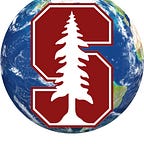Class of 2018: we’ve learned a lot, we’ve seen a lot, and we’ve done some, but we have so much more to do…
The following is a speech written by Campbell Howe, International Relations ’18, who was selected as a student speaker at the International Relations (IR) diploma ceremony on June 17, 2018, at Stanford University.
Stanford teaches us that we can do anything. (Well, actually my CS 106A grade taught me that I could not code). I know it sounds trite, even cliché, but I also know that I am standing in front of the most impressive group of individuals. I am in the midst of future Senators, military commanders, news broadcasters, NGO founders, and I sincerely believe (and hope) the next President of the United States. We can do anything we put our minds to, and in today’s world, we have to.
You all know as well as I the horrors that exist beyond the beautiful land moat that encircles Stanford’s campus. War rages on in Syria. Genocide continues in Darfur and Myanmar. Ice caps are melting in the Arctic. Political repression has become commonplace in places like Turkey. Gender inequality persists in every country.
Yet after today we carry with us a degree in International Relations from Stanford University. And that means something. To me, that means change.
We have already started to engage in world affairs and improve them. I’ve seen a classmate forego his quarter abroad in Paris to work with Syrian refugees in Calais. One of my friends had the privilege to work at the U.S. Mission to the United Nations. (She knows how envious I am of that). Another classmate handled a Stanford workload while helping run a political campaign in her Kentucky hometown. Someone else here today worked with CNN in India and advocated for increased reliance on solar power there. As for me, I had the privilege of working with an education-technology company, and built out its initiative to provide high-need populations with access to world-class education.
Stanford teaches us that we have to engage with the problems of the world, and the International Relations department gave us the tools to do just that. They handed us these tools both in and beyond the classroom, and I know the class of 2018 grabbed them with both hands.
We took Introduction to Political Science and learned about the importance of credible commitments through theories like the Prisoner’s Dilemma and the Stag Problem. We read Samantha Power’s scathing critique of America’s foreign policy towards human rights abuses and felt compelled never to repeat the mistakes of the past. We signed up for countless introductory seminars whose topics spanned from Paul Farmer and Partners in Health to the controversies surrounding World War I. We all suffered through statistics. (Is anyone else thrilled we no longer have weekly quizzes?) We’ve listened to Professor Abbas Milani’s incredible experiences in Iran. We’ve taken the dreaded five-days-a-week early morning language classes. We participated in Dr. Condoleezza Rice’s 48-hour crisis simulation in which we were given the daunting task of solving the North Korean nuclear crisis. We’ve read and written millions of pages and I don’t know about you, but my eyesight has really suffered.
Despite perhaps some vision impairment, our vision of the world grew clearer. That clarity was strengthened when we were afforded the opportunity to experience the world firsthand — abroad.
Our quarters abroad were many things. Of course, they were fun. But more than that, they were enlightening. We learned how to be on our own, in a foreign country, relatively disconnected. (Wi-Fi coverage abroad simply does not compare to that in Silicon Valley). We gained independence. And whether we were randomly stumbling across protests in the streets of our host cities, or discussing with foreigners how Donald Trump won the 2016 Presidential Election, our education transcended the academic. We were able to see and participate in the world that we had read so much about.
And it was our professors who helped us make sense of it all — our classes, our quarters abroad, our engagements with complex current events, and our Stanford experience itself. Before seminar discussions Bertrand Patenaude would comment on the latest political headlines, making any student feel guilty for sleeping in instead of reading The New York Times that morning. Condoleezza Rice provided insights into public service and uplifted students’ hopes regarding the future of democracy. Norman Naimark made Stanford instantly feel like home by recounting stories of his own experiences at Stanford and inviting his classes to his home for dinners. He never failed to keep up with his students, and provided reassurances even to uncertain seniors about their career decisions. Our professors have changed our lives and countless other students before us. To all of our professors, I think I speak for every student here when I say thank you.
To the students here this afternoon, I leave you with this: We’ve learned a lot. We’ve seen a lot. And we’ve done some. But we have so much more to do.
Congratulations to the Class of 2018. I can’t wait to see what’s next!
View more graduation highlights via Instagram. For more information about Stanford University’s 127th Commencement, click here.
